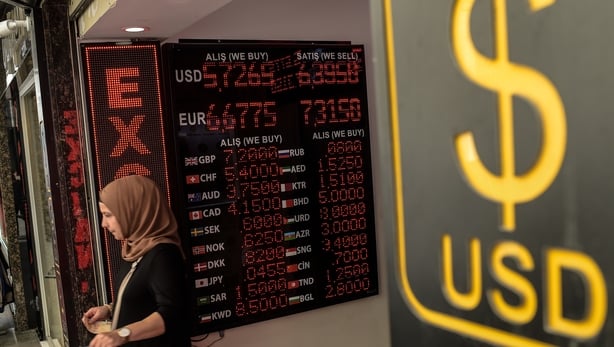Turkish President Recep Tayyip Erdogan accused the United States of seeking to stab Turkey "in the back" over a diplomatic row sparked by the detention of a US pastor that has sent the lira into a tailspin.
"You act on one side as a strategic partner but on the other you fire bullets into the foot of your strategic partner," Mr Erdogan told a conference in the capital Ankara.
"We are together in NATO and then you seek to stab your strategic partner in the back. Can such a thing be accepted?" Mr Erdogan asked.
He said he expected attacks on Turkey's economy to continue but predicted the lira would return to "rational levels" soon, after the Turkish currency hit a record low of more than 7 to the US dollar.
The country’s finance minister Berat Albayrak said Turkey would start implementing an economic action plan this morning.
The lira has lost 44% against the dollar this year, largely over worries about President Erdogan's influence over the economy, his repeated calls for lower interest rates and worsening ties with the United States.
The lira's relentless fall turned to meltdown on Friday. It dropped as much as 18% at one stage, rattling US and European stocks as investors took fright over banks' exposure to Turkey.
Today, the renewed lira collapse hit Asian shares, weakened the South African rand and drove demand in global markets for safe currencies, including the US dollar, Swiss franc and yen.
Mr Albayrak said yesterday that Turkey had drafted a economic action plan and would start implementing it to ease investor concerns.
"From Monday morning onwards our institutions will take the necessary steps and will share the announcements with the market," he said, without giving details.
Read More:
Trump doubles tariffs on steel, aluminum from Turkey
Turkey's lira crisis: How bad can it get?
Blue Bay Asset Management strategist Timothy Ash said the plan should have been ready before Asian markets opened.
"They are just always behind the curve, always catching up, always too late, and then the damage is done. Text book stuff of how not to manage a crisis," he wrote on Twitter.
Mr Albayrak said budget discipline would be the most important foundation of Turkey's new economic approach and fiscal rules would be implemented for targeted indicators if necessary.
The minister also said a plan had been prepared for banks and the "real" economy, including small to mid-sized businesses which are most affected by the foreign exchange fluctuations.
"We will be taking the necessary steps with our banks and banking watchdog in a speedy manner," he said.
Mr Albayrak dismissed any suggestion that Turkey might intervene in dollar-denominated bank accounts, saying any seizure or conversion of those deposits into lira was out of the question.

In the interview with Hurriyet newspaper, Mr Albayrak described the lira's weakness as "an attack," echoing Mr Erdogan - who is his father-in-law.
Mr Erdogan, who has called himself an "enemy of interest rates," wants cheap credit from banks to fuel growth, but investors fear the economy is overheating and could be set for a hard landing.
We need your consent to load this rte-player contentWe use rte-player to manage extra content that can set cookies on your device and collect data about your activity. Please review their details and accept them to load the content.Manage Preferences
Yesterday, speaking to supporters in Trabzon on the Black Sea coast, Mr Erdogan dismissed suggestions that Turkey was in a financial crisis like those seen in Asia two decades ago.
The lira's free fall was the result of a plot and did not reflect economic fundamentals, he said. "What is the reason for all this storm in a tea cup? There is no economic reason ... This is called carrying out an operation against Turkey," he said.
The central bank raised interest rates to support the lira in an emergency move in May, and again the following month. But it did not tighten monetary policy at its last meeting three weeks ago.
Turkey's banking watchdog BBDK in a statement said it was limiting banks' foreign exchange swap transactions.

